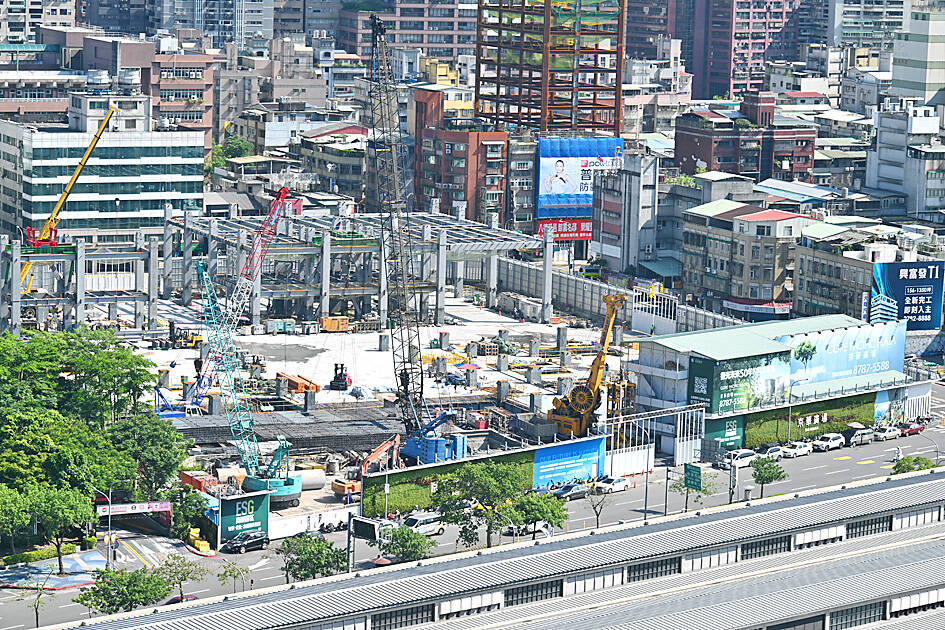Taipei City Government’s Department of Urban Planning said that Core Pacific City Co’s (京華城) redevelopment project had undergone required urban planning procedures, but whether they were legitimate should be determined by the courts, Taipei Mayor Chiang Wan-an (蔣萬安) said yesterday.
Chiang made the remark in response to reporters’ questions on the sidelines of a speech to the Chinese American Academic and Professional Association in New York during his visit to the US.
Taiwan People’s Party (TPP) Chairman Ko Wen-je (柯文哲) on Thursday was detained and held incommunicado for alleged corruption in the Core Pacific City redevelopment project, which was allowed to increase its floor area ratio to 840 percent while Ko was in his second term as Taipei mayor.

Photo: Tien Yu-hua, Taipei Times
After Ko’s detention, the TPP on Friday said the city government’s urban planning department in January issued a news release stating that the redevelopment project complied with the principles of “appropriateness, public interest, fair consideration and legality.”
However, Taipei Deputy Mayor Lee Ssu-chuan (李四川) on Sunday said the document was a clarification in response to the Control Yuan’s correction on the redevelopment project.
“In principle, it explained that after we [the department] reviewed the process, we found that it met the procedures required by the Urban Planning Act (都市計畫法),” he said.
“Whether it is legal, of course, is up to the court to judge,” he said. “We did not say it is legal, only that it complied with proper procedures.”
Asked to comment on the issue, Chiang said that “the review procedure of the Core Pacific City project had complied with the Urban Planning Act’s procedures, but whether it is legitimate… We must respect the court’s decision.”
The case is in the judicial inquiry stage, so the city government respects its investigation, Chiang said.
Hopefully it would be dealt with based on the principle of “not unjustly accusing the innocent, nor showing mercy to the guilty,” he said.
If illegal conduct is found, the perpetrators must be held accountable, Chiang added.

Taiwan has received more than US$70 million in royalties as of the end of last year from developing the F-16V jet as countries worldwide purchase or upgrade to this popular model, government and military officials said on Saturday. Taiwan funded the development of the F-16V jet and ended up the sole investor as other countries withdrew from the program. Now the F-16V is increasingly popular and countries must pay Taiwan a percentage in royalties when they purchase new F-16V aircraft or upgrade older F-16 models. The next five years are expected to be the peak for these royalties, with Taiwan potentially earning

STAY IN YOUR LANE: As the US and Israel attack Iran, the ministry has warned China not to overstep by including Taiwanese citizens in its evacuation orders The Ministry of Foreign Affairs (MOFA) yesterday rebuked a statement by China’s embassy in Israel that it would evacuate Taiwanese holders of Chinese travel documents from Israel amid the latter’s escalating conflict with Iran. Tensions have risen across the Middle East in the wake of US and Israeli airstrikes on Iran beginning Saturday. China subsequently issued an evacuation notice for its citizens. In a news release, the Chinese embassy in Israel said holders of “Taiwan compatriot permits (台胞證)” issued to Taiwanese nationals by Chinese authorities for travel to China — could register for evacuation to Egypt. In Taipei, the ministry yesterday said Taiwan

Taiwan is awaiting official notification from the US regarding the status of the Agreement on Reciprocal Trade (ART) after the US Supreme Court ruled US President Donald Trump's global tariffs unconstitutional. Speaking to reporters before a legislative hearing today, Premier Cho Jung-tai (卓榮泰) said that Taiwan's negotiation team remains focused on ensuring that the bilateral trade deal remains intact despite the legal challenge to Trump's tariff policy. "The US has pledged to notify its trade partners once the subsequent administrative and legal processes are finalized, and that certainly includes Taiwan," Cho said when asked about opposition parties’ doubts that the ART was

If China chose to invade Taiwan tomorrow, it would only have to sever three undersea fiber-optic cable clusters to cause a data blackout, Jason Hsu (許毓仁), a senior fellow at the Hudson Institute and former Chinese Nationalist Party (KMT) legislator, told a US security panel yesterday. In a Taiwan contingency, cable disruption would be one of the earliest preinvasion actions and the signal that escalation had begun, he said, adding that Taiwan’s current cable repair capabilities are insufficient. The US-China Economic and Security Review Commission (USCC) yesterday held a hearing on US-China Competition Under the Sea, with Hsu speaking on